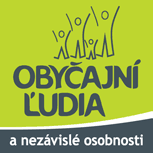Ordinary People (Slovakia)
| Ordinary People and Independent Personalities Obyčajní Ľudia a nezávislé osobnosti | |
|---|---|
 | |
| Leader | Igor Matovič |
| Founded | 28 October 2011 |
| Split from | Freedom and Solidarity |
| Headquarters | Bratislava |
| Ideology | Conservatism[1][2] |
| Political position | Centre-right[3] |
| European affiliation | none |
| International affiliation | none |
| European Parliament group | European Conservatives and Reformists |
| Colours | Light green |
| National Council |
13 / 150 |
| European Parliament |
1 / 13 |
| Website | |
|
obycajniludia | |
|
Politics of Slovakia Political parties Elections | |
Ordinary People (Slovak: Obyčajní Ľudia), full name Ordinary People and Independent Personalities[4] (Slovak: Obyčajní Ľudia a nezávislé osobnosti, OĽaNO), is a conservative[5] political party in Slovakia. It ran four candidates on the list of the Freedom and Solidarity (SaS) party in the 2010 parliamentary election to the National Council, and all four were elected. The party is led by Igor Matovič, one of the four MPs.
The four Ordinary People MPs were Igor Matovič, Erika Jurinová, Martin Fecko, Jozef Viskupič.[6] OĽaNO sat in the National Council with the SaS and signed an agreement with the SaS that its members could not cross the floor to another group. In June and July 2010,[6] it was rumoured that OĽaNO would refuse to back the programme of the new centre-right coalition,[7] which included Freedom and Solidarity, and whose majority depended on Ordinary People.[8]
In August 2010, Matovič said that it was not the right time to become an independent party.[8] However, on 28 October 2011, Ordinary People filed a formal party registration, while Matovič announced that the party would compete in 2012 parliamentary election as a separate electoral list, of independents and representatives of the Civic Conservative Party and the Conservative Democrats.[1] During the 2012 election the party came in third place overall, winning 8.55% of the vote and 16 seats.[9]
In the 2014 European elections, OĽaNO came in fourth place nationally, receiving 7.46% of the vote and electing 1 MEP.[10]
Footnotes
- 1 2 http://www.visegradgroup.eu/news/ordinary-people-files
- ↑ Parties and Elections in Europe: The database about parliamentary elections and political parties in Europe, by Wolfram Nordsieck
- ↑ Freedom House (24 December 2013). Nations in Transit 2013: Democratization from Central Europe to Eurasia. Rowman & Littlefield Publishers. p. 517. ISBN 978-1-4422-3119-1.
- ↑ "Ordinary People and Independent Personalities party releases its election slate", The Slovak Spectator, 15 December 2011, retrieved 31 January 2012
- ↑ Tom Lansford (15 April 2013). Political Handbook of the World 2013. SAGE Publications. p. 1292. ISBN 978-1-4522-5825-6.
- 1 2 Vilikovská, Zuzana (15 June 2010). "SaS chairman speaks about its new MPs from the Ordinary People civic association". The Slovak Spectator.
- ↑ Vilikovská, Zuzana (5 August 2010). "'Ordinary Man' MP Matovič accuses Fico of lying". The Slovak Spectator.
- 1 2 Vilikovská, Zuzana (3 August 2010). "SaS: Ordinary People faction will give up their parliamentary seats if they leave SaS caucus". The Slovak Spectator.
- ↑ Slovakia turns left, The Economist (11 March 2012)
- ↑ http://ep2014.statistics.sk/EP-dv/Tabulka3_en.html
| ||||||||||||||||||